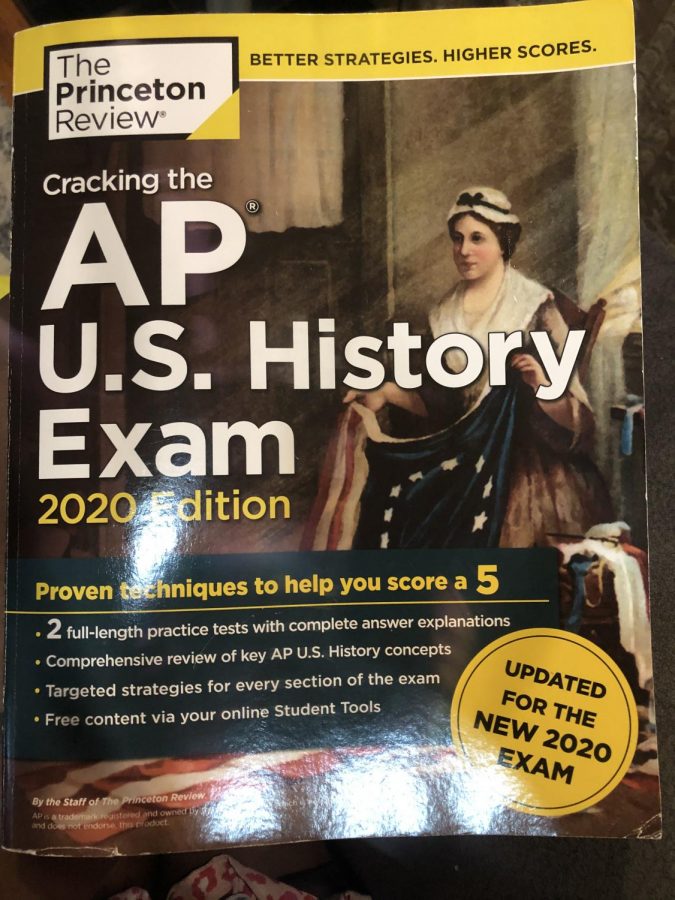Study Tips for Testing Season (Part 1)
Photo by Yetunde Olagbegi
Pictured here is my APUSH Princeton Review review book that I used to study for the exam last year. I found its explanations and practice exams very helpful!
Testing season is just around the corner. The time in which students are assessed on an entire year’s worth of material which can seem daunting, and it is. We can be tested on anything, even topics we learned as early as September which means forming an extensive, yet doable studying plan can work wonders in our favor. Everyone has their own ways of doing this whether it be hiring a tutor, or making thousands of flashcards, etc. But if you find yourself stuck on what path to approach or want a refresher on some helpful studying tips for final exams, then keep on reading. A few months ago, I wrote a three-part guide including some general tips on focus strategies, time management, and studying that you might find helpful in addition to this article. You can find part one of the three-part series, here. Without further ado, here is everything you need to know to be prepared for the upcoming testing season:
- Form a study group.
A year’s worth of material is hard to recall in only a few months, which is why a few other people may help you to accomplish this. Getting a few friends together to study for finals might be just what you need to hone your focus while bouncing creative ideas off each other. Studying in a group is shown to help prevent procrastination because the other people in the group can prevent you from getting distracted and help you stay on task. You and your friends can also compare notes to clarify difficult concepts while also giving you an opportunity to rewrite and add to your notes so they can be the best they can possibly be. Forming a study group can also make studying more enjoyable. Instead of studying by yourself, you can study in a group environment which is less draining and way more fun. You may also learn more studying habits/tips from observing your friends, which is an added plus!
- Watch review videos.
Watching review videos are a sure-fire way to study for final exams. Whether it be a review video that covers an entire unit, or a single topic, review videos are an engaging way to re-learn and recap previous lessons you learned in school. Review videos are both quick and efficient and allow you to review material anywhere and anytime as long as you have an internet connection. More often than not, these lessons come with visual images that can help you process the information better and faster. Review videos are also more engaging which can make studying more fun than mulling over your notes. Videos can also be great tools in learning complex topics because of how highly visual they are, and their tendency to provide step-by-step procedures for answering questions. If you’re unsure where to find helpful videos, ask your teacher. Teachers tend to have a good bank of helpful resources and will most likely know the best review videos out there. YouTube is also another great resource. Popular channels tend to come up when searching for specific subjects/topics, and popular channels tend to be the ones students found most helpful, and which you might find helpful as well. Khan Academy is also renowned for its great video resources, and it’s also free!
- Start studying early.
To be honest, you should already be studying for final exams, but it’s perfectly fine if you haven’t already! Allow this article to be a wake-up call. As mentioned before, final exams assess you on an entire school years’ worth of material, which means it’s your job to review all of that material before exam day. This does not mean, however, that you should start studying the week before final exams. I know it is tempting to do so, but it will only harm you in the end. The later you start studying, the more you risk burning yourself out. It’s easier to study the night before for an exam because you are only reviewing a few days’ or weeks’ worth of material whereas final exams expect you to review tens of weeks’ worth of material. See the difference? There is no “right” time to start reviewing for final exams. Some start spring break, some even start at the beginning of the new year, it all depends on how much time you think you’ll need to prepare (you know yourself the best!). But you should not use that as an excuse to push off studying until the very last minute because this will only hurt you in the end. You won’t be able to review as much as you’d like to, this can significantly increase your stress, and most importantly, you’ll start your computer, or you’ll walk into the classroom on test day knowing you didn’t do everything in your power to ensure your best performance on the exam.
- Make flashcards.
Flashcards improve memory by utilizing practiced information retrieval. If the grueling act of writing flashcards is not appeasing to you, online flashcards are a worthy alternative that you can consider. There are many apps for this, some popular ones include– Quizlet, Anki, Brainscape, etc. If you decide to make flashcards for an entire year’s worth of material, organization is key. You’ll be looking at tens, maybe hundreds of flashcards, so it would be optimal to split your decks by unit/topic so they are easy to maneuver around and make studying so much easier. Flashcards, however, are better for some topics over others. For instance, I find flashcards especially helpful when studying formulas and vocabulary words, but not when reviewing more complex topics. I elaborate on the benefits and drawbacks in part three of my previous series which you can find here.
- Buy a review book.
At times, when reviewing a year’s worth of material, you don’t know where to start. Review books are a great solution to this common predicament. Review books compress an entire course worth’s of material into one book. In this regard, it is similar to a textbook, however, review books usually focus on the key concepts whereas textbooks tend to be more elaborative and explanatory. Some people like this aspect because they are able to review the topics that will most likely be tested in a concise and easy manner without having to waste time flipping through a year’s worth of notes, some of which won’t even be tested on the exam. Review books also focus more on practice questions and exams, some of which include practice exams that mirror the real exam you will take at the end of the year, which can really fortify your test-taking skills and help you perform better on the exam. Review books are definitely hit or miss, which is why it is important to do your research before purchasing one. It’s also important to note that one company may have a great review book for one subject, while having a not-so-great book for another subject. Teachers can also be a great resource to seek out when choosing the review book that’s best for you. Online reviews are also a great way of discerning which review books work best, because once reading what worked for others and what didn’t, you can collect the necessary information to see which review book you’d benefit from the most. Some brands that students tend to like include–Kaplan, Barron’s, Princeton Review, Crash Course, and 5 Steps to a 5. But don’t limit yourself to these brands, figure out which is best for you.
That’s all for part one. Stay tuned for part 2!






